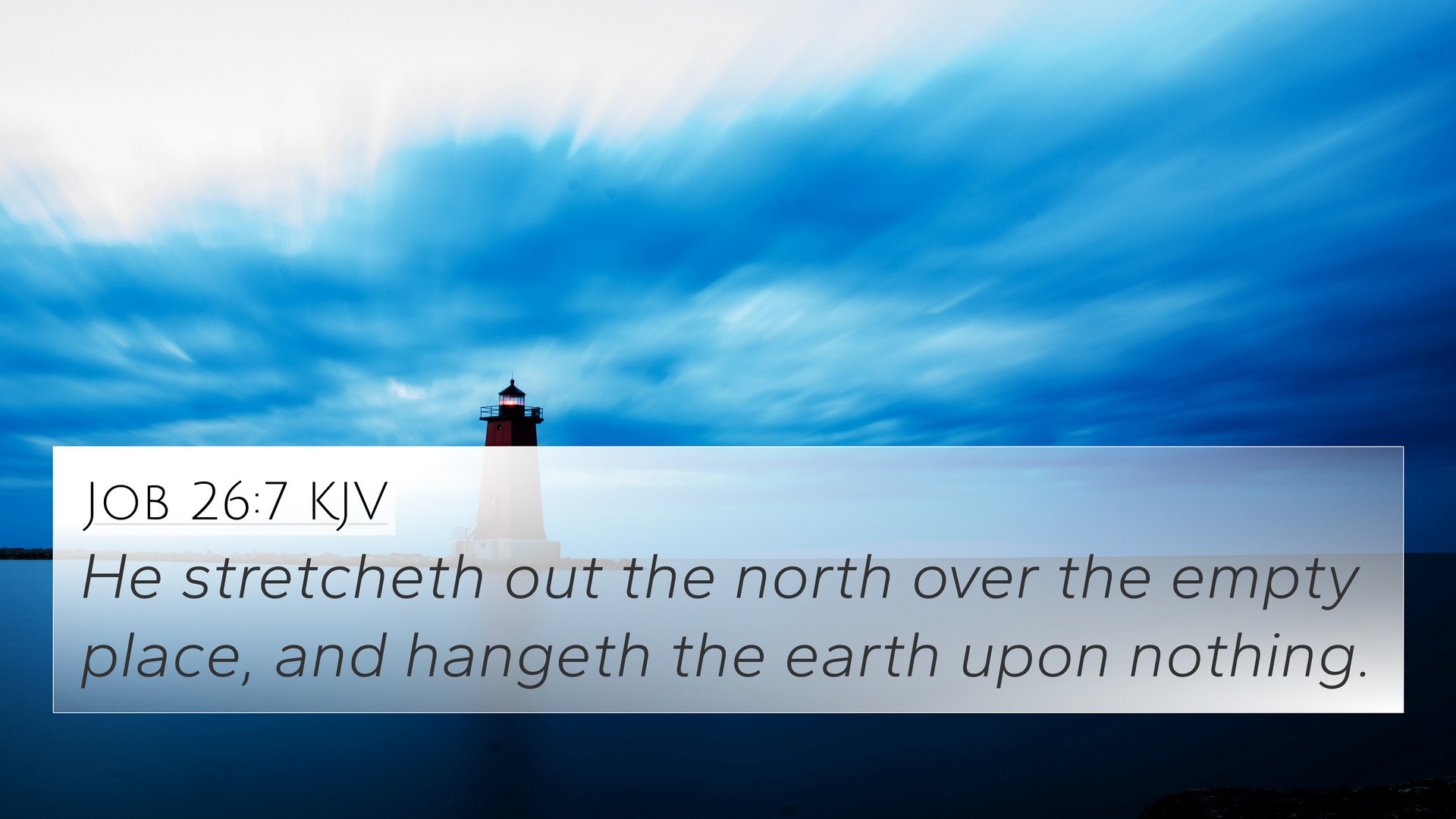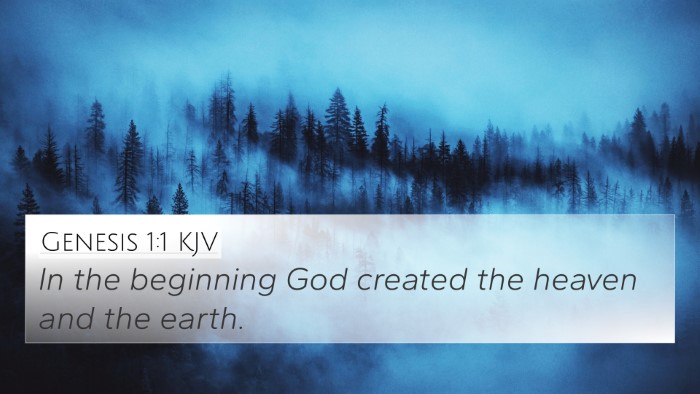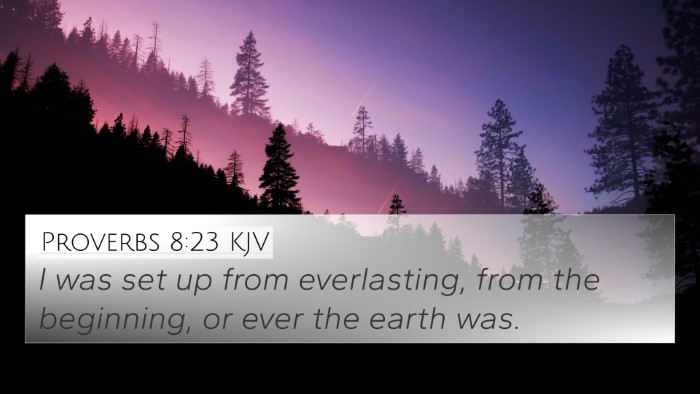Old Testament
Genesis Exodus Leviticus Numbers Deuteronomy Joshua Judges Ruth 1 Samuel 2 Samuel 1 Kings 2 Kings 1 Chronicles 2 Chronicles Ezra Nehemiah Esther Job Psalms Proverbs Ecclesiastes Song of Solomon Isaiah Jeremiah Lamentations Ezekiel Daniel Hosea Joel Amos Obadiah Jonah Micah Nahum Habakkuk Zephaniah Haggai Zechariah MalachiJob 26:7 Similar Verses
Job 26:7 Cross References
He stretcheth out the north over the empty place, and hangeth the earth upon nothing.
Uncover the Rich Themes and Topics of This Bible Verse
Listed below are the Bible themes associated with Job 26:7. We invite you to explore each theme to gain deeper insights into the Scriptures.
Job 26:7 Cross Reference Verses
This section features a detailed cross-reference designed to enrich your understanding of the Scriptures. Below, you will find carefully selected verses that echo the themes and teachings related to Job 26:7 KJV. Click on any image to explore detailed analyses of related Bible verses and uncover deeper theological insights.
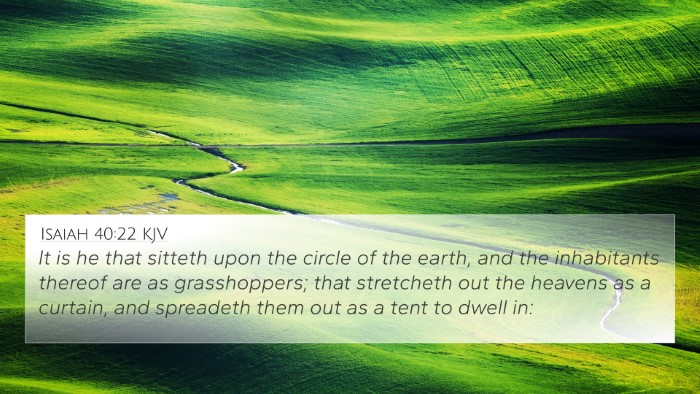
Isaiah 40:22 (KJV) »
It is he that sitteth upon the circle of the earth, and the inhabitants thereof are as grasshoppers; that stretcheth out the heavens as a curtain, and spreadeth them out as a tent to dwell in:

Psalms 104:2 (KJV) »
Who coverest thyself with light as with a garment: who stretchest out the heavens like a curtain:

Isaiah 40:26 (KJV) »
Lift up your eyes on high, and behold who hath created these things, that bringeth out their host by number: he calleth them all by names by the greatness of his might, for that he is strong in power; not one faileth.
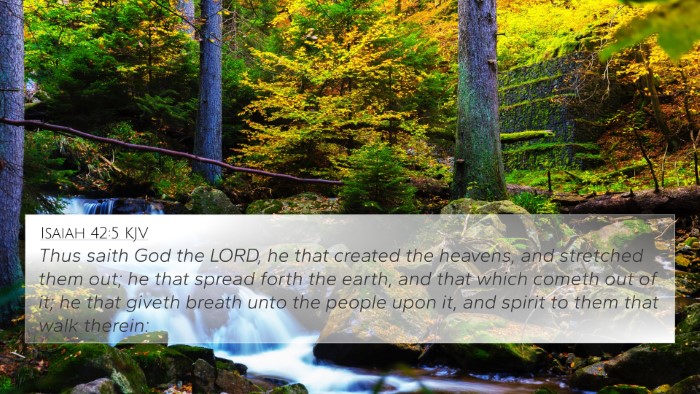
Isaiah 42:5 (KJV) »
Thus saith God the LORD, he that created the heavens, and stretched them out; he that spread forth the earth, and that which cometh out of it; he that giveth breath unto the people upon it, and spirit to them that walk therein:
Job 26:7 Verse Analysis and Similar Verses
Understanding Job 26:7: A Combined Commentary Overview
Verse Reference: Job 26:7 - "He stretcheth out the north over the empty place, and hangeth the earth upon nothing."
Verse Meaning and Insights
The verse demonstrates God's supreme power in the creation and maintenance of the universe. Job, in his discourse, reflects on the majesty of God as he describes how God has suspended the earth in space, emphasizing that it is upheld by His mighty hand alone. This not only reveals God's omnipotence but also His wisdom in governance over the natural order.
Commentary Insights
-
Matthew Henry:
Henry emphasizes that God's creation is both vast and incomprehensible. Here, he highlights the 'emptiness' referred to in the text as the cosmos that cannot contain God. He sees this as an invitation to reflect on the greatness of God, who operates beyond human understanding.
-
Albert Barnes:
Barnes comments on the metaphor of God stretching out the northern sky and the imagery of hanging the earth on nothing. It underscores both the physical realities of the cosmos and a theological assertion of God's sovereign control over creation. He illustrates that unlike human structures, God’s kingdom is not built upon anything earthly or corporeal.
-
Adam Clarke:
Clarke provides a detailed linguistic analysis, noting how the phrase "hangeth the earth upon nothing" signifies the miraculous nature of Earth’s suspension. He also draws parallels to the idea of divine sustenance, wherein God is portrayed as the ultimate support of life and existence.
Theological Themes and Cross-References
This verse not only reflects on God's power but invites readers to link it with various themes throughout the Scripture. Below are some pertinent cross-references that enhance our understanding through comparative biblical analysis.
Related Bible Verses
- Isaiah 40:22 - "It is he that sitteth upon the circle of the earth..." - Signifying God's sovereignty over the earth's structure.
- Psalm 104:5 - "The Lord established the earth upon its foundations, so it will never move." - Illustrating divine stability in creation.
- Proverbs 8:27 - "When he prepared the heavens, I was there..." - Awareness of God’s creative process.
- Colossians 1:17 - "And he is before all things, and by him all things consist." - Connecting the New Testament view of Christ’s role in creation.
- Hebrews 1:3 - "Upholding all things by the word of his power." - Echoing the sustaining hand of God in existence.
- Job 38:4 - "Where wast thou when I laid the foundations of the earth?" - Emphasizing God’s authority in creation.
- Psalm 19:1 - "The heavens declare the glory of God..." - The cosmos as a testimony to God’s power.
Connections Between Bible Verses
The connection established through these verses supports Job 26:7 as a vital representation of God's omnipotence. Through thematic verse connections, we can observe how the Bible interweaves the concepts of creation, divine sustenance, and God's overarching authority.
Using Cross-References for Better Understanding
When believers engage with scripture, utilizing tools for Bible cross-referencing can enhance their study and understanding of biblical themes. Here are some strategies:
- Bible Concordance: A handy reference tool for locating verses related to a specific theme or word.
- Cross-Reference Bible Study: This method helps identify parallel verses and contextual relationships.
- Bible Reference Resources: Various resources are available to develop personal cross-reference systems.
- Identification of Connections: Understanding how Old and New Testament scriptures interact around similar themes.
Conclusion
Job 26:7 encapsulates the profoundness of God's creation and offers a glimpse into His magnificent sovereignty. By exploring associated verses and engaging in comparative Bible verse analysis, believers can deepen their understanding of God's words and His nature. The act of linking Bible scriptures enriches the study of theology and enhances spiritual growth.
Exploring Further
To further explore inter-Biblical dialogue, one could study other verses that emphasize the creation narrative and God’s sustaining presence. The thematic connections in the scripture serve not only to affirm theological principles but also to reflect on the cosmic majesty of God, as illustrated in Job's profound assertion.
